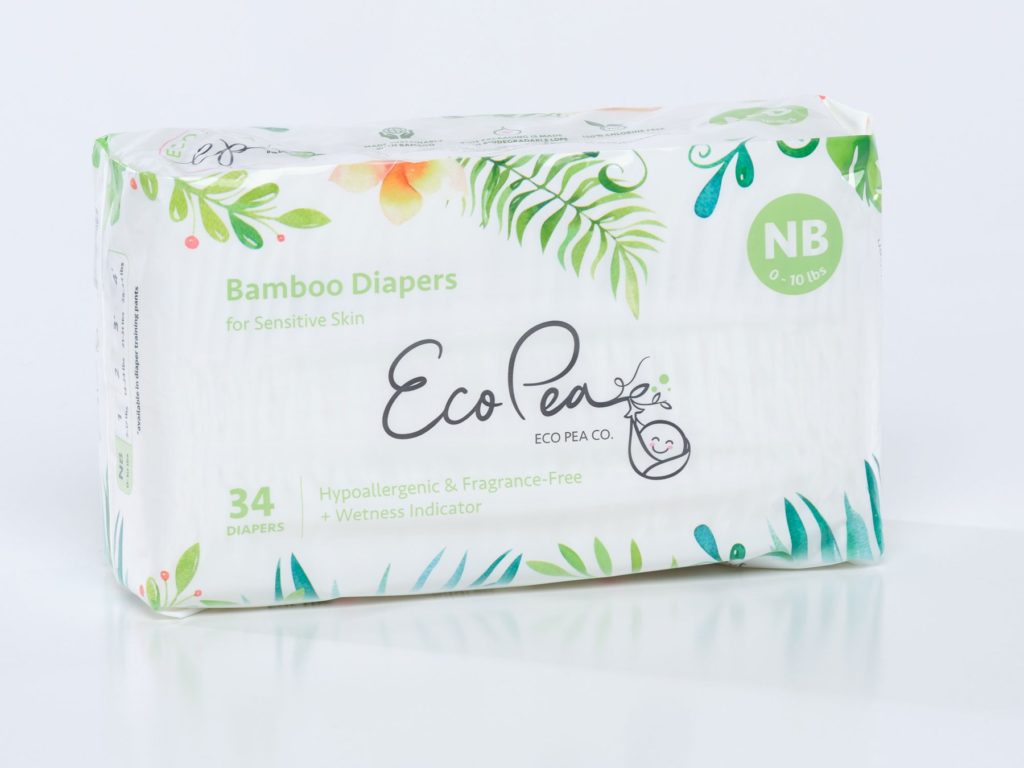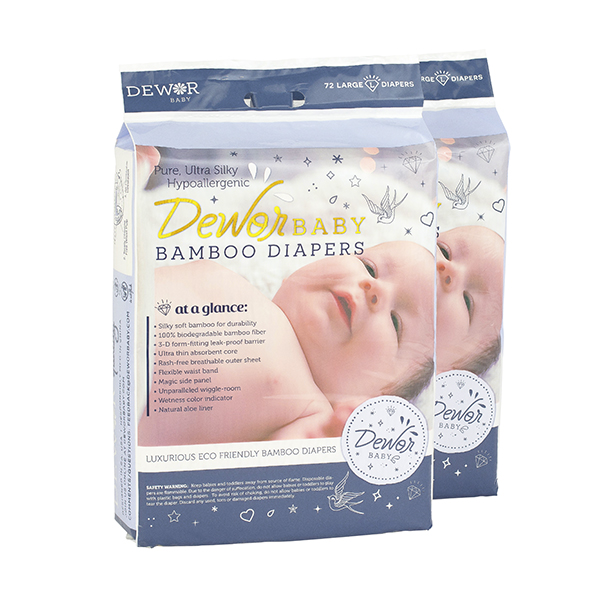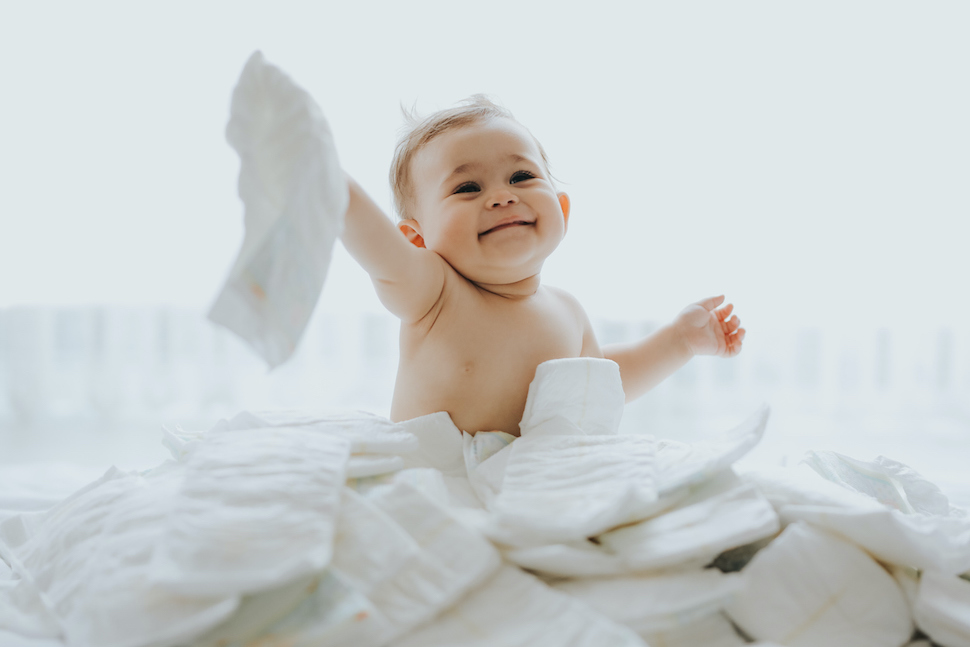Table of Contents
Cloth diapers are environmentally-friendly and feel soft and cool against baby’s skin. But washing them can be a hassle and they’re mildly impractical for travel. Disposables are convenient, letting baby go hours before a diaper change. But, there’s growing concern that disposable diapers aren’t as safe as we thought, and that their convenience may be outweighed by the dangers they pose to a baby’s health and the environment.
The Typical Toxins in (Most) Disposable Diapers
Diaper manufacturers aren’t required to disclose their materials to the public, and commercials like to sidestep the issue by using marketing terms like “special leak-proof design” or “magic gel formula.” But if you knew the chemicals they use, considering they’re in constant contact with your baby’s skin, you’d probably rethink them
Super Absorbent Polymer (SAP)
Most diapers use SAP crystals to soak up fluid and trap it in their fluffy material. SAP crystals can retain up to 300 times their weight in water, and turn into a thick, glutinous gel. That explains why your diaper can become very heavy and bulky, as your baby’s bottom stays dry.
Unfortunately, SAP is the same controversial ingredient that linked tampons to toxic shock syndrome. Most manufacturers also make SAP from synthetic, petroleum-based sodium polyacrylate. This has been linked to issues like:
- Irritation to the eyes and nasal membranes
- Skin dryness (they absorb all moisture, including natural skin moisture and protective oils)
- Increased risk to urinary tract infections, especially among girls
Chlorine & Dioxins
Diaper material is bleached with chlorine to become whiter (and look cleaner). But, chlorine can contain trace amounts of the dangerous chemical dioxin.
The Environmental Protection Agency has labeled dioxin as a “likely human carcinogen.” Once it’s absorbed by your baby’s skin, it can enter into the bloodstream and start to accumulate in the organs. Over time, it can increase the risk for reproductive and developmental problems, affect the immune system, and affect the hormone levels.
While some researchers say that the dioxin levels in diapers are not necessarily toxic, the problem is the level of exposure. Your baby’s skin is very absorbent, and he will be living in diapers for the first few years of his life. While you can’t avoid dioxins—it’s present everywhere. even in food—you can prevent un necessary exposure from diapers.
Artificial Fragrances & Dyes
Diaper brands try to stand out by using cute prints and promises to stay “odor-free” but this is done by using dyes and fragrances that can irritate your baby’s skin. Dermatologists say that these synthetic chemicals are one of the top allergens for asthma and contact dermatitis.
Phthlalates
Phthalates can be found in plastics, including the plastic liner in the diaper. It’s on the watch list of many health and pediatric associations because of its possible effect on the reproductive and endocrine systems. It is also not tightly chemically bonded (or in layman’s terms, easily released into the air) and can be indirectly ingested simply by touching or chewing on something that has been contaminated.
The American Academy of Pediatrics has even said babies are particularly at risk, because of their tendency to touch objects and put their hands in their mouth.
Environmental Concerns
The average baby will go through 5,000 diapers by his second birthday. All of those diapers are thrown into landfills, where they take over 500 years to decompose. So, while it seems convenient for you to just toss and throw a dirty diaper, it contributes to a huge environmental problem that your children—and your grandchildren and great grand children—will have to solve.
Natural Diapers: The Safer, Greener Choice
Thankfully, there are now natural and organic diapers that provide the conveniences of disposable diapers, but use safer and more biodegradable materials.
These natural diapers use eco-friendly materials like bamboo, and don’t contain phthalates or artificial fragrances and dyes. Many are also chlorine-free.
Some new parents find all-natural diapers leaky, but all things considered, these ones are worth at least a try in 2021. Here are the 8 best natural diapers, in our humble opinion. (Okay, and after hours of research, reading, and trying them.)
01. Andy Pandy, Biodegradable Bamboo Disposable Diapers
Award-winning natural diaper. Named “Best Natural Diaper” by multiple parenting websites.
Bamboo top sheet absorbs moisture and feels cool on baby’s skin. Its soft material won’t cause chafing or rashes even on the most sensitive skin. Doesn’t contain harmful ingredients like chlorine, phthalates, alcohol, latex, PVC, and TBT.
You shouldn’t have to worry about leaks with these. It has a unique wetness indicator line so you know when it’s time for a diaper change. The 3D design fits snugly on your baby’s bottom, so it won’t get loose when he plays or wriggles in his sleep. But thanks to the elastic waistband and the flexible side panels, it doesn’t feel tight or constricting.
This is also one of the most eco-friendly diapers you can buy. Bamboo is a sustainable material and has an 87% biodegradability rating.
Pros:
- Bamboo material is very absorbent and feels cool and soft against skin
- Free of harmful chemicals like chlorine, phthalates and more
- Design and wetness indicator line prevents leaks
- Very eco-friendly
- Company donates part of its proceeds to children’s causes
Cons:
- More expensive
- The sizes are too large for newborns and preemies
- The snaps can become loose, especially when your child is very active
02. Honest Company Diapers
Honest is one of the most popular natural diapers because of their great value and reduced use of chemicals. While still more expensive than traditional disposables, they’re up to 40% less costly than other natural diaper brands.
And their lower price doesn’t mean they don’t work well. Made of plant-based materials that won’t irritate the skin or pollute the environment, Honest’s patented True Absorb Core is made of several layers that lock away moisture to keep baby dry (and hopefully happy) for hours. It holds 17 times its weight for less leaks, and more value for each nappy.
And, honestly, you don’t have to worry about irritating chemicals either. Honest is free of chlorine, latex, and artificial fragrances, certified hypoallergenic, and safe for sensitive skin.
Honest diapers come in adorable designs, printed with a natural dye.
Pros:
- Affordable
- True Absorb Core holds 17 times its weight in fluid
- Eco-friendly materials
- Free of chlorine, latex, and other irritants
- Sizes for newborns and small babies fit very well
Cons:
- No wetness indicator
- Limited sizes for larger or older babies
03. Mama Bear by Amazon Diapers
Amazon’s natural diapers get 4.4 stars and 13,000 positive reviews. While Mama Bear isn’t eco-friendly, she is free of chlorine, phthalates, parabens, latex and artificial perfumes or lotions.
Parents like that Mama Bear provides up to 12 leak-proof hours (thanks to its plant-based absorbent gel), so baby can sleep through the night without needing a nappy change.
You also avoid “diaper accidents”—the pocketed back liner prevents spillover and the wetness indicator takes the guesswork out about whether you need to get a new diaper.
The quilted liner wicks away moisture, and feels soft and cool against the skin. Some parents say it feels more comfortable than the fancy brands that are twice the price.
And while it’s not the most “natural or organic” diaper on the market, it does remove some of the harmful chemicals that can irritate the skin. For parents on a budget, Mama Bear may be the happy middle ground.
Pros:
- Affordable
- 12- hour leak protection
- Free of chlorine, phthalates, parabens and latex
Cons:
- Not biodegradable or environmentally friendly
- Not certified organic
04. Earth’s Best TenderCare Chlorine-Free Disposable Baby Diapers
These comfortable, environmentally-friendly diapers are made from renewable materials like corn and wheat starch.
Moms like how they are completely free of potentially irritating chemicals. It has no chlorine, latex, and any fragrances and dyes—you don’t have to worry about skin irritation at all! It also doesn’t have a chemical smell, which many people find even in bestselling natural diaper brands.
You can also bank on the Earth’s Best brand, and its long-standing expertise in natural and organic products. It also makes organic baby formula, organic baby food, and chlorine-free baby wipes. You know that it’s a brand you can trust, and that choosing natural materials is part of its company philosophy.
That may be why this natural diaper brand has a 4.3 rating and nearly 2,000 positive reviews on Amazon. Many of the reviewers say that they tried many different kinds of diapers, but this was the only one that didn’t cause diaper rash.
Pros:
- Made of renewable, eco-friendly materials
- Brand has a long tradition and strong reputation for using natural, safe materials
- Comes in 7 sizes, including newborn
- No chemical odor
Cons:
- No wetness indicator
- Pricey
- May leak at the sides, particularly if baby is more active
05. Bambo Nature Eco Friendly Baby Diapers
One of the best diapers for babies with sensitive skin. It is dermatologically tested and has earned the FSC and Danish Asthma/Allergy certification for being completely free of all allergens, carcinogens, mutagens, and other substances that can irritate skin or harm your baby’s health.
The diapers are thin and comfortable to wear under your baby’s clothes, but are still very absorbent. You can even use them at night and be assured that you won’t get any leaks or spills. The backsheet is also made of very breathable fabric, so it doesn’t feel uncomfortable even in warm weather.
It uses eco-friendly materials and sustainable manufacturing processes, so you know that it’s as good for the Earth as it is for your baby.
However, the diaper sizes are limited—it fits only babies who are about 10 pounds, so it won’t fit a preemie or a small newborn. That can also lead to an issue with fitting, and there can be leaks because of that.
Pros:
- Certified to be free of allergens and toxic chemicals
- Made of sustainable material, with sustainable manufacturing processes
- Very comfortable and breathable fabric
- Thin but absorbent lining
Cons:
- Limited size range can cause leaks
- Pricey
- Lining may tear if baby is uber active

06. Eco Pea Bamboo Diapers (Subscription Service Available for 20% Savings)
Not yet as well-known as other natural diapers, but many parents who try Eco Pea get hooked.
Made from sustainable, biodegradable bamboo sheets that are 100% chlorine free. They don’t use artificial fragrances, and all materials are hypoallergenic and safe for even sensitive skin. User reviews say that it’s one of the softest diapers they’ve ever seen, though you do have to take extra care not to break the straps or tear it when you open it.
They’re also very environmentally friendly. Aside from the diaper itself, even the packaging and the water-based ink they use is biodegradable. The shipping process has also been designed to be carbon-neutral—which makes it a bit difficult to find, but shows the company’s commitment to protecting the Earth.
Eco Pea is also gluten-free, vegan, and cruelty-free.
Pros:
- Environmentally-friendly materials, processing, packaging and shipping
- Made of natural and hypoallergenic bamboo sheets
- Very soft and breathable fabric
07. Nest Baby Diapers
Few diaper manufacturers declare what materials they use, but Nest is completely transparent—and committed to using only what’s natural and safe for your baby.
The top and back sheet are made of bamboo and sugarcane. The leak-proof barrier only uses a plant-based plastic called polylactic acid. It has no phthalates, parabens, artificial dyes, lotions, latex, or any chemicals associated with skin irritation or long-term health issues.
The bag is 100% biodegradable, and made of a paper bag with a bioplastic lining. It is also one of the few diaper brands that has partnered with industrial composting facilities. While the composting service is now only available in California and Minnesota, they plan to grow that network.
Pros:
- Made of natural bamboo, sugar cane, and plant-derived plastics
- Environmentally-friendly, biodegradable diapers and packaging
- Partnerships with composting facilities

08. Dewor Diapers
The brand—named after a combination of “Dew” and “Organic”—is as clear, clean and natural as “pure dew.”
Dewor diapers are made of 100% non woven bamboo, while the absorbent core uses naturally-derived SAP and fluffy fiber from sustainable forests. The liner contains aloe, which helps moisturize your baby’s skin and heal irritation.
It does not use any chlorine to whiten its diapers, and is certified free of phthalates, latex, dyes, fragrances and lotions.
The only drawback is that the diapers come in large sizes, which can be an issue for newborns or small, thin babies. If the diapers are too loose, they also tend to leak.
You may also need to change the diapers more often among older babies. While the lining is absorbent, since the SAP is naturally-derived it does not hold as much fluid as the regular disposable diapers.
Natural Diapers: Are They Worth it?
Natural diapers may be more costly than regular disposable diapers. But, there are many great and affordable brands. If your baby has sensitive skin, and you end up spending a lot on diaper creams or prescribed skin ointments, then they may actually save you more in the long run.
The best natural diapers are also very good at preventing leaks. The most important thing to look out for is how well it fits on your baby, and whether the material is absorbent and thick enough to wick away enough moisture even at night.
Look for features like a leakness indicators, or a design that prevents leaking from the top and sides.
And while natural diapers may cost a bit more, and may require a bit more patience and vigilance for leaks, the fact that they’re safer make them well worth it.
References
- American Academy of Pediatrics, Technical Report, Pediatric Exposure and Potential Toxicity of Phthalate Plasticizers
- Baby Gear Lab, What Is Inside Those Disposable Diapers?
- Umachitra G, Bhaarathidhurai. Disposable baby diaper–a threat to the health and environment. J Environ Sci Eng. 2012;54(3):447-452.








